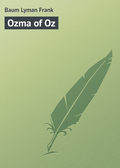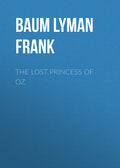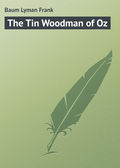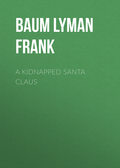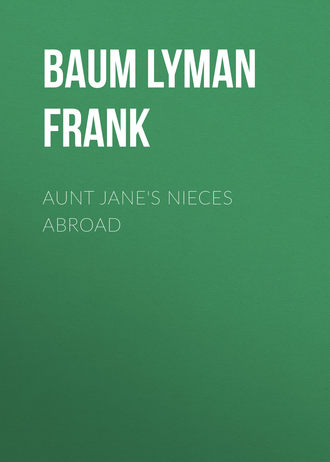
Лаймен Фрэнк Баум
Aunt Jane's Nieces Abroad
CHAPTER XI
THE EAGLE SCREAMS
Despite the glories of the Amalfi road our tourists decided it was more pleasant to loiter around Sorrento for a time than to undertake further excursions. The mornings and evenings were chill, but during the middle of the day the air was warm and delicious; so the girls carried their books and fancy-work into the beautiful gardens or wandered lazily through the high-walled lanes that shut in the villas and orange groves. Sometimes they found a gate open, and were welcomed to the orchards and permitted to pluck freely the fragrant and rich flavored fruit, which is excelled in no other section of the south country. Also Uncle John, with Beth and Patsy, frequented the shops of the wood-workers and watched their delicate and busy fingers inlaying the various colored woods; but Louise mostly kept to the garden, where Count Ferralti, being a semi-invalid, was content to sit by her side and amuse her.
In spite of her uncle's discovery of the false position assumed by this young man, Louise seemed to like his attentions and to approve his evident admiration for her. His ways might be affected and effeminate and his conversational powers indifferent; but his bandaged wrist was a constant reminder to all the nieces that he possessed courage and ready wit, and it was but natural that he became more interesting to them because just now he was to an extent helpless, and his crippled hand had been acquired in their service.
Uncle John watched the young fellow shrewdly, but could discover little harm in him except his attempt to deceive them in regard to his name and position. Yet in his mature eyes there was not much about Ferralti to arouse admiration, and the little man considered his girls too sensible to be greatly impressed by this youthful Italian's personality. So he allowed him to sit with his nieces in the gardens as much as he pleased, believing it would be ungrateful to deprive the count of that harmless recreation.
"A reg'lar chaperone might think differently," he reflected; "but thank goodness there are no dragons swimming in our cup of happiness."
One day they devoted to Capri and the Blue Grotto, and afterward they lunched at the Quisisana and passed the afternoon in the town. But the charms of Sorrento were too great for Capri to win their allegiance, and they were glad to get back to their quaint town and delightful gardens again.
The week passed all too swiftly, and then came a letter from Colonel Angeli telling them to return to Naples and witness the results of the eruption. This they decided to do, and bidding good-bye to Signor Floriano and his excellent hotel they steamed across the bay and found the "Vesuve" a vastly different hostelry from the dismal place they had left in their flight from Naples. It was now teeming with life, for, all danger being past, the tourists had flocked to the city in droves. The town was still covered with ashes, but under the brilliant sunshine it did not look as gloomy as one might imagine, and already thousands of carts were busily gathering the dust from the streets and dumping it in the waters of the bay. It would require months of hard work, though, before Naples could regain a semblance of its former beauty.
Their friend the Colonel personally accompanied them to the towns that had suffered the most from the eruption. At Boscatrecasa they walked over the great beds of lava that had demolished the town – banks of cinders looking like lumps of pumice stone and massed from twenty to thirty feet in thickness throughout the valley. The lava was still so hot that it was liable to blister the soles of their feet unless they kept constantly moving. It would be many more days before the interior of the mass became cold.
Through the forlorn, dust-covered vineyards they drove to San Guiseppe, where a church roof had fallen in and killed one hundred and forty people, maiming many more. The Red-Cross tents were pitched in the streets and the whole town was one vast hospital. Ottajano, a little nearer to the volcano, had been buried in scoria, and nine-tenths of the roofs had fallen in, rendering the dwellings untenable.
From here a clear view of Mt. Vesuvius could be obtained. The shape of the mountain had greatly altered and the cone had lost sixty-five feet of its altitude. But when one gazed upon the enormous bulk of volcanic deposit that littered the country for miles around, it seemed to equal a dozen mountains the size of Vesuvius. The marvel was that so much ashes and cinders could come from a single crater in so short a period.
Naples was cleaning house, but slowly and listlessly. The people seemed as cheerful and light-hearted as ever. The volcano was one of their crosses, and they bore it patiently. The theatres would remain closed for some weeks to come, but the great Museo Nationale was open, and Uncle John and his nieces were much interested in the bronze and marble statuary that here form the greatest single collection in all the world.
It was at the Museum that Mr. Merrick was arrested for the first time in his life, an experience he never afterward forgot.
Bad money is so common in Naples that Uncle John never accepted any change from anyone, but obtained all his silver coins and notes directly from the Banca Commerciale Italiana, a government institution. One morning he drove with the girls to the museum and paid the cabman a lira, but before he could ascend the steps the man was after him and holding out a leaden coin, claiming that his fare had given him bad money and must exchange it for good. This is so common a method of swindling that Uncle John paid no heed to the demands of the cabman until one of the Guard Municipale, in his uniform of dark blue with yellow buttons and cap, placed a restraining hand upon the American's shoulder.
Uncle John angrily shook him off, but the man persisted, and an interpreter employed by the museum stepped forward and explained that unless the cabman was given a good coin in exchange for the bad one the guarde would be obliged to take him before a commissionaire, or magistrate.
"But I gave him a good coin – a lira direct from the bank," declared Uncle John.
"He exhibits a bad one," returned the interpreter, calmly.
"He's a swindler!"
"He is a citizen of Naples, and entitled to a just payment," said the other, shrugging his shoulders.
"You are all leagued together," said Uncle John, indignantly. "But you will get no more money out of me, I promise you."
The result was that the stubborn American was placed under arrest. Leaving the girls at the museum in charge of Ferralti, who had made no attempt to interfere in the dispute but implored Uncle John to pay and avoid trouble, the angry prisoner was placed in the same cab he had arrived in and, with the officer seated beside him, was publicly driven to the office of the magistrate.
This official understood no English, but he glowered and frowned fiercely when the American was brought before him. The guarde and the cabman stood with bared bowed heads and in low tones preferred the charge against the prisoner; but Uncle John swaggered up to the desk and pounded his clinched fist upon it while he roared a defiance of Italian injustice and threatened to "bring over a few war-ships and blow Naples into kingdom come!"
The magistrate was startled, and ordered the prisoner searched for concealed weapons. Uncle John doubled his fists and dared the guarde to touch him.
Then the cabman was dispatched for someone who could speak English, and when an interpreter arrived the American told him to send for the United States consul and also to inform the magistrate that nothing but war between America and Italy could wipe out the affront that had been thrust upon him.
The magistrate was disturbed, and preferred not to send for the consul. He offered to release Uncle John if he would give the cabman a good lira in exchange for the bad one. The official fee would be five lira – or say three lira – or even two. Uncle John flatly refused to pay anything to anybody. Only war could settle this international complication – bloody and bitter war. The consul must cable at once for war-ships and troops. He would insist upon it. All compromise was now impossible!
The magistrate was frightened. The guarde's eyes bulged with horror and he trembled visibly. It was evident they had made a grave mistake in arresting this mad American, who was evidently a personage of great importance and able to declare war at a moment's notice. The cabman, the magistrate, the guarde and the interpreter put their heads together and chattered voluble Italian – all speaking at once in excited tones – while Uncle John continued to warn them at the top of his lungs that their country was doomed to sudden annihilation and they were the culprits responsible for the coming calamity.
As a result they bundled the irate American into the carriage again and drove him poste haste back to the museum, where they deposited him upon the steps. Then in a flash the guarde and the cabman disappeared from sight and were seen no more.
The victor smiled proudly as his nieces rushed toward him.
"Did you have to pay another lira, Uncle?" asked Patsy, anxiously.
"Not on your life, my dear," mopping his brow vigorously. "They're a lot of cutthroats and assassins – policemen, magistrates and all – but when the eagle screams they're wise enough to duck."
The girls laughed.
"And did the eagle scream, then?" Patsy enquired.
"Just a little, my dear; but if it whispered it would sound mighty loud in this mummified old world. But we've lost enough time for one day. Come; let's go see 'Narcissus' and the 'Dancing Faun.'"
CHAPTER XII
MOVING ON
"Here's a letter from my dear old friend Silas Watson," said Uncle John, delightedly. "It's from Palermo, where he has been staying with his ward – and your friend, girls – Kenneth Forbes, and he wants me to lug you all over to Sicily at once."
"That's jolly," said Patsy, with a bright smile. "I'd like to see Kenneth again."
"I suppose he is a great artist, by this time," said Beth, musingly.
"How singular!" exclaimed Louise. "Count Ferralti told me only this morning that he had decided to go to Palermo."
"Really?" said Uncle John.
"Yes, Uncle. Isn't it a coincidence?"
"Why, as for that," he answered, slowly, "I'm afraid it will prevent our seeing the dear count – or whatever he is – again, at least for some time. For Mr. Watson and Kenneth are just leaving Palermo, and he asks us to meet him in another place altogether, a town called – called – let me see; Tormenti, or Terminal, or something."
"Give me the letter, dear," said Patsy. "I don't believe it's Terminal at all. Of course not," consulting the pages, "it's Taormina."
"Is that in Sicily?" he asked.
"Yes. Listen to what Mr. Watson says: 'I'm told it is the most beautiful spot in the world, which is the same thing you hear about most beautiful places. It is eight hundred feet above the Mediterranean and nestles peacefully in the shadow of Mount Etna.'"
"Etna!" cried Uncle John, with a start. "Isn't that another volcano?"
"To be sure," said Beth, the geographer. "Etna is the biggest volcano in the world."
"Does it spout?" he asked, anxiously.
"All the time, they say. But it is not usually dangerous."
"The proper thing, when you go to Eu-rope," declared Uncle John, positively, "is to do Venice, where the turpentine comes from, and Switzerland, where they make chocolate and goat's milk, and Paris and Monte Carlo, where they kick high and melt pearls in champagne. Everybody knows that. That's what goin' to Eu-rope really means. But Sicily isn't on the programme, that I ever heard of. So we'll just tell Silas Watson that we'll see him later – which means when we get home again."
"But Sicily is beautiful," protested Patsy. "I'd as soon go there as anywhere."
"It's a very romantic place," added Louise, reflectively.
"Everybody goes to France and Switzerland," remarked Beth. "But it's because they don't know any better. Let's be original, Uncle, and keep out of the beaten track of travel."
"But the volcano!" exclaimed Mr. Merrick. "Is it necessary to stick to volcanoes to be original?"
"Etna won't hurt us, I'm sure," said Patsy.
"Isn't there a Greek theatre at Taormina?" asked Louise.
"I've never heard of it; but I suppose the Greeks have, if it's there," he replied. "But why not wait till we get home, and then go to Kieth's or Hammerstein's?"
"You don't understand, dear. This theatre is very ancient."
"Playing minstrel shows in it yet, I suppose. Well, girls, if you say Sicily, Sicily it is. All I'm after is to give you a good time, and if you get the volcano habit it isn't my fault."
"It is possible the Count said Taormina, instead of Palermo," remarked Louise, plaintively. "I wasn't paying much attention at the time. I'll ask him."
The others ignored this suggestion. Said Patsy to her uncle:
"When do we go, sir?"
"Whenever you like, my dears."
"Then I vote to move on at once," decided the girl. "We've got the best out of Naples, and it's pretty grimey here yet."
The other nieces agreed with her, so Uncle John went out to enquire the best way to get to Sicily, and to make their arrangements.
The steamer "Victor Emmanuel" of the Navigazione General Italiana line was due to leave Naples for Messina the next evening, arriving at its destination the following morning. Uncle John promptly booked places. The intervening day was spent in packing and preparing for the journey, and like all travellers the girls were full of eager excitement at the prospect of seeing something new.
"I'm told Sicily is an island," grumbled Uncle John. "Here we are, on a trip to Eu-rope, and emigrating to an island the first thing we do."
"Sicily is Europe, all right, Uncle," answered Patsy. "At least, it isn't Asia or Africa."
That assertion seemed to console him a little, and he grew cheerful again.
The evening was beautiful as they embarked, but soon after leaving the bay the little, tub-shaped steamer began to tumble and toss vigorously, so that all the passengers aboard speedily sought their berths.
Uncle John found himself in a stuffy little cabin that smelled of tar and various other flavors that were too mixed to be recognizable. As a result he passed one of the most miserable nights of his life.
Toward morning he rolled out and dressed himself, preferring the deck to his bed, and the first breath of salt air did much to restore him. Day was just breaking, and to the right he could see a tongue of fire flaming against the dark sky.
"What is that, sir?" he enquired of an officer who passed.
"That is Stromboli, signor, the great volcano of Lipari. It is always in eruption."
Uncle John groaned.
"Volcanoes to right of us, volcanoes to left of us volleyed and thundered," he muttered dismally, as he fell back in his chair.
The sky brightened, and the breath of the breeze changed and came to him laden with delicious fragrance.
"See, signore!" called the officer, passing again; "before us is mighty Etna – you can see it clearly from the bow."
"Volcanoes in front of us, volcanoes behind us!" wailed the little man. But he walked to the bow and saw the shores of Sicily looming in advance, with the outline of the stately mountain rising above and dominating it.
Then the sun burst forth, flooding all with a golden radiance that was magical in its gorgeous effects. Patsy came on deck and stood beside her uncle, lost in rapturous admiration. Beth soon followed her.
Before long they entered the Straits of Messina and passed between the classic rock of Scylla on the Calabrian coast, and the whirlpool of Charybdis at the point of the promontory of Faro, which forms the end of the famous "Golden Sickle" enclosing the Bay of Messina.
"If this is really Eu-rope, I'm glad we came," said Uncle John, drawing a long breath as the ship came to anchor opposite the Palazzo Municipale. "I don't remember seeing anything prettier since we left New York."
Presently they had loaded their trunks and hand baggage, and incidentally themselves, into the boat of the Hotel Trinacria which came alongside in charge of a sleepy porter. After a brief examination at the custom-house, where Uncle John denied having either sugar, tobacco or perfumery, they followed on foot the truck laden with their worldly possessions, and soon reached the hotel.
A pleasant breakfast followed, which they ate before a window overlooking the busy marina, and then they drove about the town for a time to see in a casual way the "sights." In the afternoon they took the train for Taormina. Messina seemed a delightful place, but if they were going to settle in Taormina for a time it would not pay them to unpack or linger on the way.
So they rolled along the coast for a couple of hours in a quaint, old-fashioned railway carriage, and were then deposited upon the platform of the little station at Giardini.
"I'm afraid there has been a mistake," said the little man, gazing around him anxiously. "There's no town here, and I told the guard to put us off at Taormina – not this forlorn place."
Just then Beth discovered a line of carriages drawn up back of the station. The drivers were mostly asleep inside them, although several stood in a group arguing in fluent Italian the grave question as to whether Signora Gani's cow had a black patch over its left shoulder, or not.
Some of the carriages bore signs: "Hotel Timeo;" "Grand Hotel San Domenico;" "Hotel Castello-a-Mare;" "Grand Hotel Metropole," and so forth. In that of the Castello-a-Mare the man was awakening and rubbing his eyes. Uncle John said to him:
"Good morning. Had a nice rest?"
"I thank you, signore, I am well refreshed," was the reply.
"By the way, can you tell us where the town of Taormina is? I hate to trouble you; but we'd like to know."
The man waved an arm upward, and following the motion with their eyes they saw a line of precipitous cliffs that seemed impossible to scale.
"Do you desire to go to the Grand Hotel Castello-a-Mare?" enquired the driver, politely.
"Is it in Taormina?"
"Most certainly, signore."
"And you will take us?"
"With pleasure, signore."
"Oh; I didn't know. I supposed you were going to sleep again."
The man looked at him reproachfully.
"It is my business, signore. I am very attentive to my duties. If you permit me to drive you to our splendide – our magnifico hotel – you will confer a favor."
"How about the baggage?"
"The trunks, signor, we will send for later. There is really no hurry about them. The small baggage will accompany us. You will remark how excellent is my English. I am Frascatti Vietri; perhaps you have heard of me in America?"
"If I have it has escaped my memory," said Uncle John, gravely.
"Have you been to America?" asked Beth.
"Surely, signorina. I lived in Chicago, which, as you are aware, is America. My uncle had a fruit shop in South Water, a via which is Chicago. Is it not so? You will find few in Taormina who can the English speak, and none at all who can so perfectly speak it as Frascatti Vietri."
"You are wonderful," said Patsy, delighted with him. But Uncle John grew impatient to be off.
"I hate to interrupt you, Mr. Vietri," he hinted; "but if you can spare the time we may as well make a start."
The driver consented. He gracefully swung the suit-cases and travelling bags to the top of the vehicle and held the door open while his fares entered. Then he mounted to his seat, took the reins, and spoke to the horses. Some of the other drivers nodded at him cheerfully, but more as if they were sorry he must exert himself than with any resentment at his success in getting the only tourists who had alighted from the train.
As they moved away Uncle John said: "Observe the difference between the cab-drivers here and those at home. In America they fight like beasts to get a job; here they seem anxious to avoid earning an honest penny. If there could be a happy medium somewhere, I'd like it."
"Are we going to the best hotel?" asked Louise, who had seemed a trifle disconsolate because she had not seen Count Ferralti since leaving Naples.
"I don't know, my dear. It wasn't a question of choice, but of necessity. No other hotel seemed willing to receive us."
They were now winding upward over a wonderful road cut in the solid rock. It was broad and smooth and protected by a parapet of dressed limestone. Now and then they passed pleasant villas set in orchards of golden oranges or groves of olives and almonds; but there was no sign of life on any side.
The road was zigzag, making a long ascent across the face of the cape, then turning abruptly to wind back again, but always creeping upward until an open space showed the station far below and a rambling stone building at the edge of the cliff far above.
"Behold!" cried Frascatti, pointing up, "the Grand Hotel Castello-a-Mare; is it not the excellenza location?"
"Has it a roof?" asked Uncle John, critically.
"Of a certainty, signore! But it does not show from below," was the grave reply.
At times Frascatti stopped his horses to allow them to rest, and then he would turn in his seat to address his passengers in the open victoria and descant upon the beauties of the panorama each turn unfolded.
"This road is new," said he, "because we are very progressive and the old road was most difficulty. Then it was three hours from the bottom to the top. Now it is but a short hour, for our energy climbs the three miles in that brief time. Shall I stop here for the sunset, or will your excellenzi hasten on?"
"If your energy approves, we will hasten," returned Uncle John. "We love a sunset, because it's bound to set anyway, and we may as well make the best of it; but we have likewise an objection to being out after dark. Any brigands around here?"
"Brigands! Ah; the signor is merry. Never, since the days of Naxos, have brigands infested our fair country."
"When were the days of Naxos?"
"Some centuries before Christ, signor," bowing his head and making the sign of the cross.
"Very good. The brigands of those days must, of course, be dead by this time. Now, sir, when you have leisure, let us hasten."
The horses started and crept slowly upward again. None of the party was in a hurry. Such beautiful glimpses of scenery were constantly visible from the bends of the road that the girls were enraptured, and could have ridden for hours in this glorious fairyland.
But suddenly the horses broke into a trot and dragged the carriage rapidly forward over the last incline. A moment later they dashed into the court of the hotel and the driver with a loud cry of "Oo-ah!" and a crack of his whip drew up before the entrance.
The portiere and the padrone, or landlord – the latter being also the proprietaire – came out to greet them, extending to their guests a courteous welcome. The house was very full. All of the cheaper rooms were taken; but of course the Signor Americain would wish only the best and be glad to pay.
Uncle John requested them to rob him as modestly as possible without conflicting with their sense of duty, and they assured him they would do so.
The rooms were adorable. They faced the sea and had little balconies that gave one a view of the blue Mediterranean far beneath, with lovely Isola Bella and the Capo San Andrea nestling on its bosom. To the right towered the majestic peak of Etna, its crest just now golden red in the dying sunset.
The girls drew in deep breaths and stood silent in a very ecstacy of delight. At their feet was a terraced garden, running downward two hundred feet to where the crag fell sheer to the sea. It was glorious with blooming flowers of every sort that grows, and the people on the balconies imagined at the moment they had been transferred to an earthly paradise too fair and sweet for ordinary mortals. And then the glow of the sun faded softly and twilight took its place. Far down the winding road could be seen the train of carriages returning from the station, the vetturini singing their native songs as the horses slowly ascended the slope. An unseen organ somewhere in the distance ground out a Neapolitan folk song, and fresh and youthful voices sang a clear, high toned accompaniment.
Even practical Uncle John stood absorbed and admiring until the soft voice of the facchino called to ask if he wanted hot water in which to bathe before dinner.
"It's no use," said Patsy, smiling at him from the next balcony with tears in her eyes; "There's not another Taormina on earth. Here we are, and here we stay until we have to go home again."
"But, my dear, think of Paris, of Venice, of – "
"I'll think of nothing but this, Uncle John. Unless you settle down with us here I'll turn milkmaid and live all my days in Sicily!"
Beth laughed, and drew her into their room.
"Don't be silly, Patsy dear," she said, calmly, although almost as greatly affected as her cousin. "There are no cows here, so you can't be a milkmaid."
"Can't I milk the goats, then?"
"Why, the men seem to do that, dear. But cheer up. We've only seen the romance of Taormina yet; doubtless it will be commonplace enough to-morrow."



